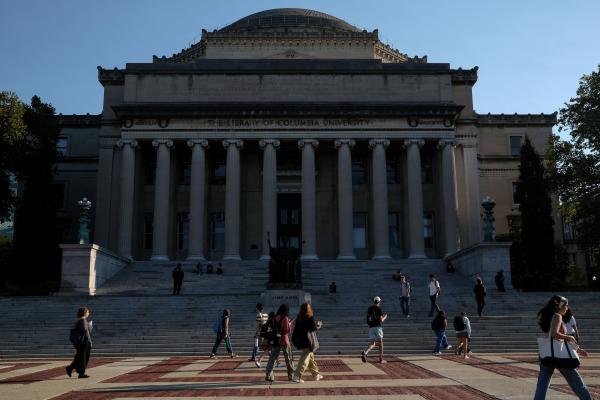As the assistant professor of medical ethics at Columbia University Vagelos College of Physicians and Surgeons for the past three years, I have had a front row seat to the trials and terror of the past couple of years. And while I am preparing to transition to another professorship, I cannot remain silent about the crisis at Columbia.
Students and faculty alike have rightly been troubled by Israel’s genocide in Gaza and how Columbia’s administration has responded to students protesting the genocide. Students and faculty have also been frustrated by and fearful of the actions and threats of a federal government set on making an example out of Columbia. Adding to those frustrations and disappointments are the concessions that the administration and board recently made in order to recoup the $400 million of grant funding that President Donald Trump previously withdrew.
There comes a time when an institution, similar to a person, must choose between conscience and comfort. Columbia, in capitulating to the federal government’s threats and funding constraints, has chosen comfort over conscience. By choosing capital over conviction, self-preservation over truth, and the principalities and powers over the people it claims to serve, Columbia has betrayed the trust of its students and faculty. The university, formerly a beacon of inquiry, now cowers before the power of death.
In his 1973 An Ethic for Christians and Other Aliens in a Strange Land, the late New York lawyer and Episcopal laytheologian William Stringfellow defined “principalities” as “militant, aggressive, and immensely influential creatures” — such as governments, corporations, institutions, and ideologies — that hazard to wield power over human beings, often corrupting and dehumanizing individuals if not “identified” and their operation understood “vis-a-vis one another and in relation to human beings.”
In Free in Obedience (1964) and then Conscience and Obedience (1977), Stringfellow linked these principalities to the power of death, while arguing that they operate through fear, violence, and idolatry to dominate human existence — all themes central to his theological critiques of American, industrial, and corporate society and the “demons” that work to rule it. Accordingly, Stringfellow saw such principalities for what they were — not mere bureaucratic structures or governing bodies but spiritual forces that enslave, manipulate, and ultimately destroy (Ephesians 6:12). Such principalities are legion.
These death-serving principalities are currently manipulating Columbia, pressuring it to trade its integrity for security, truth for funding, and courage for compliance. Accordingly, like many other institutions, bowing before the principalities, it has proven itself afraid to lose the favor of fragile and foolish leaders who wield threats like tyrants clutching at the last shreds of authority.
What makes Columbia’s capitulation all the more insidious is the rhetoric it employs to justify its cowardice. The administration clothes its capitulation in the language of responsible stewardship, safety and security, and protection from antisemitism. This language is being wielded as a weapon. The administration is using this language as an instrument of control rather than using it to demonstrate a commitment to the practice of genuine inquiry, reconciliation, and justice.
Of course the irony is that the institution, which is eager to claim the mantle of free expression, has become an enforcer of suppression (too often by police proxy and the scapegoating of students who are fodder for political spectacle and punishment), while patrolling thought and speech to ensure its own continued favor with the powers that be. This is not a defense of truth or free expression. It is an act of submission to the machinery that has long sought to co-opt education as a tool to control rather than liberate.
But what, exactly, has Columbia lost in its obeisance? It has lost the opportunity to model a different kind of faithfulness: a faithfulness that resists the temptation of mammon; a faithfulness that refuses to become a pawn in the hands of the empire; a faithfulness that demonstrates a willingness to redistribute its own hoarded capital for the well-being of a community. Yet the university’s decision has laid bare its priorities, which we can see more clearly now are neither scholarship, nor free expression, nor the flourishing of its people, but the perpetuation of its survival.
A humanizing response to this moment, which would resist the allure of the principalities and powers of death, would require something radical. It would require something unfathomable to an institution so accustomed to power and patronage: it would require a practice of dissent. It would require that Columbia break from the chains of federal funding and the coercive dictates of the state and, instead, put its vast $14.8 billion endowment to work for the sake of people striving for knowledge, justice, and human flourishing.
Of course, the institution already draws from its endowment to support students, faculty, and university initiatives. During the previous fiscal year, Columbia’s spending rate from its endowment was 5.2%. But in order to support students, promote the flourishing of the community, and exorcise the demon of mammon, Columbia should do the courageous thing by tapping into its endowment to fight back against the powers of death.
But Columbia has shown no such courage. It has chosen to align itself with the powers and principalities. In doing so, it now participates in the great lie that sustains the power of death: that wealth is more valuable than wisdom, that obedience is more profitable than integrity, and that institutions must survive even at the cost of their souls.
This is the nature of idolatry. Columbia has knelt before the false god of capital while offering its legacy for a mess of pottage (Genesis 25:30-34) — it has abandoned its tradition of academic freedom, activism, and intellectual leadership for the fleeting benefits of federal funding, political favor, and image management. Of course, Columbia is not alone. Other institutions, including the church, are making similar choices while trading their prophetic witness for safety and political expediency.
But there is another way. If Columbia had the will, it could show the world that an institution doesn’t need to be beholden to the whims of the principalities. They, like us, are fallen too, which means such institutions can be redeemed and not simply opposed, as theologian Walter Wink made clear in his 1984 Naming the Powers. Such institutions can still bear witness to the truths revealed through acts of costly integrity and self-critique.
Stringfellow goes further, saying that the power of death — on which the principalities rely — is ultimately undone by the resurrection of Christ, which exposes their impotence and idolatry.
German theologian Dorothee Sölle, whose political theology was shaped by the horrors of fascism and economic oppression, insisted in her 1975 Suffering that resurrection is not merely a past event or future hope, but a present reality made visible in concrete acts of resistance and solidarity. She believed that institutions can participate in this resurrection reality when they become spaces of resistance to death-dealing powers and commit themselves to the flourishing of all life.
Of course, a secular, private institution, like Columbia, is neither the church nor a Christian. However, it might still live in the hope and reality of resurrection by refusing to organize itself around fear, prestige, or survival, and instead take the path where the practice of truth-telling, accountability, justice, and love overturn the logic of the principalities.
But that is a difficult path to take. Columbia has chosen the easy one. It has chosen to submit. It has chosen to survive rather than to live. And in that choice, Columbia has damned itself to the fate of all institutions that capitulate to the powers: it will go on existing, but it will not be free.
Got something to say about what you're reading? We value your feedback!






